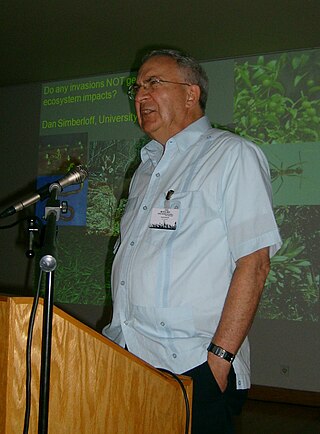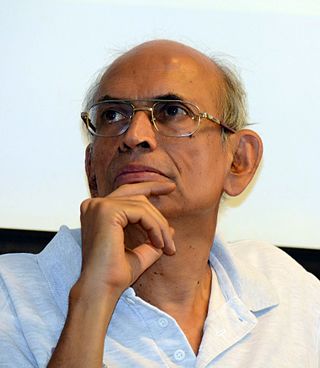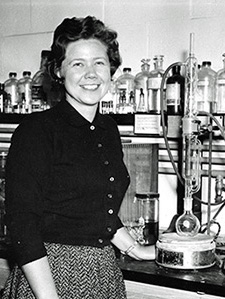Related Research Articles
Ecology is a new science and considered as an important branch of biological science, having only become prominent during the second half of the 20th century. Ecological thought is derivative of established currents in philosophy, particularly from ethics and politics.

The Ecological Society of America (ESA) is a professional organization of ecological scientists. Based in the United States and founded in 1915, ESA publications include peer-reviewed journals, newsletters, fact sheets, and teaching resources. It holds an annual meeting at different locations in the USA and Canada. In addition to its publications and annual meeting, ESA is engaged in public policy, science, education, and diversity issues.

Daniel Simberloff is an American biologist and ecologist. He earned his Ph.D. from Harvard University in 1969. He is currently Gore Hunger Professor of Environmental Science at the University of Tennessee, editor-in-chief of the journal Biological Invasions, and a member of the National Academy of Sciences.

Madhav Dhananjaya Gadgil is an Indian ecologist, academic, writer, columnist and the founder of the Centre for Ecological Sciences, a research forum under the aegis of the Indian Institute of Science. He is a former member of the Scientific Advisory Council to the Prime Minister of India and the Head of the Western Ghats Ecology Expert Panel (WGEEP) of 2010, popularly known as the Gadgil Commission.
Simon Asher Levin is an American ecologist and the James S. McDonnell Distinguished University Professor in Ecology and Evolutionary Biology and the director of the Center for BioComplexity at Princeton University. He specializes in using mathematical modeling and empirical studies in the understanding of macroscopic patterns of ecosystems and biological diversities.
F. Stuart Chapin III is a professor of Ecology at the Department of Biology and Wildlife of the Institute of Arctic Biology, University of Alaska. He was President of the Ecological Society of America (ESA) from August 2010 until 2011.
Margaret Bryan Davis (néeMargaret Bryan; was an American palynologist and paleoecologist, who used pollen data to study the vegetation history of the past 21,000 years. She showed conclusively that temperate- and boreal-forest species migrated at different rates and in different directions while forming a changing mosaic of communities. Early in her career, she challenged the standard methods and prevailing interpretations of the data and fostered rigorous analysis in palynology. As a leading figure in ecology and paleoecology, she served as president of the Ecological Society of America and the American Quaternary Association and as chair of the Department of Ecology, Evolution and Behavior at the University of Minnesota. In 1982 she was elected to the National Academy of Sciences and, in 1993, received the Eminent Ecologist Award from the Ecological Society of America.

Kamaljit Singh Bawa, FRS is an evolutionary ecologist, conservation biologist and a distinguished professor of Biology at the University of Massachusetts, Boston. He is also the founder of Ashoka Trust for Research in Ecology and Environment (ATREE). In 2012, Bawa received the first Gunnerus Sustainability Award, the world's major international award for work on sustainability. He is an elected member of the American Academy of Arts and Sciences. He was elected a Member of the American Philosophical Society in 2019.
John D. Aber is University Professor Emeritus of Natural Resources & the Environment at the University of New Hampshire, and was also for many years affiliated with the Institute for the Study of Earth, Oceans, and Space at UNH. His fields of study included Ecosystem Analysis and Modeling, Global Change, Acid Rain, Nitrogen Deposition and Sustainable Agriculture.
Brian Joseph Enquist is an American biologist and academic. Enquist is a professor of biology at the University of Arizona. He is also external professor at the Santa Fe Institute. He is a biologist, plant biologist and an ecologist. He was elected as a Fellow of the American Association for the Advancement of Science (AAAS) in 2012 and the Ecological Society of America (ESA) in 2018.
Nancy B. Grimm is an American ecosystem ecologist and professor at Arizona State University. Grimm's substantial contributions to the understanding of urban and arid ecosystem biogeochemistry are recognized in her numerous awards. Grimm is an elected Fellow of the American Geophysical Union, Ecological Society of America, and the American Association for the Advancement of Science.
Jana Compton is a research ecologist for the United States Environmental Protection Agency's (EPA) office of research and development. Her work focuses on identifying sources of nitrogen pollution and connecting those issues to how they effect our ecosystem services.

Jean H. Langenheim was an American plant ecologist and ethnobotanist, highly respected as an eminent scholar and a pioneer for women in the field. She has done field research in arctic, tropical, and alpine environments across five continents, with interdisciplinary research that spans across the fields of chemistry, geology, and botany. Her early research helped determine the plant origins of amber and led to her career-long work investigating the chemical ecology of resin-producing trees, including the role of plant resins for plant defense and the evolution of several resin-producing trees in the tropics. She wrote what is regarded as the authoritative reference on the topic: Plant Resins: Chemistry, Evolution, Ecology, and Ethnobotany, published in 2003.
Jiquan Chen is a landscape ecologist, primarily focused on nutrient flux, carbon cycling, bioenergy, and grassland ecology. He currently leads the LEES lab at Michigan State University.
Yude Pan is a senior research scientist with the Climate, Fire, and Carbon Cycle Sciences group of the Northern Research Station, USDA Forest Service, and a senior investigator of the Harvard Forest at Harvard University. Her work is in the fields of Ecosystem ecology and Global Change Biology. She studies terrestrial ecosystems and how environmental stressors affect complex interactions within those ecosystems. Much of her research focuses on forest ecosystems and how they relate to the carbon cycle as a whole, as well as forecasting complex effects of land use, climate change and air pollution on forest ecosystems.
Aimée Classen is an American ecologist who studies the impact of global changes on a diverse array of terrestrial ecosystems. Her work is notable for its span across ecological scales and concepts, and the diversity of terrestrial ecosystems that it encompasses, including forests, meadows, bogs, and tropics in temperate and boreal climates.
Katharine Nash Suding is an American plant ecologist. Suding is a Distinguished Professor of ecology and evolutionary biology at the University of Colorado Boulder and a 2020 Professor of Distinction in the College of Arts and Sciences.
Serita D. Frey is an American academic and ecologist, who serves as Professor of Environmental Science at the University of New Hampshire. Her research considers how human activities impact terrestrial ecosystems.
Lucy Hutyra is an American urban ecologist who is a professor of earth and environment at Boston University. Her research uses a multi-disciplinary approach to understand the terrestrial carbon cycle. She was named a MacArthur Fellow in 2023.
Hannah Buckley is a New Zealand ecologist, and is a full professor in the school of science at the Auckland University of Technology, specialising in biological variation in community ecological diversity through time and space.
References
- ↑ "UMass Amherst: Biology Department: Faculty: Aaron M. Ellison". www.bio.umass.edu. Retrieved 2018-03-15.
- 1 2 3 "Aaron Ellison | Harvard Forest". harvardforest.fas.harvard.edu. Retrieved 2021-01-24.
- ↑ ESA Historical Records Committee. "Past Journal Editors". esa.org. Retrieved 2018-03-15.
- ↑ Harvard Forest. "Charles Bullard Fellowship". harvardforest.fas.harvard.edu. Retrieved 2021-01-24.
- ↑ "NSF Award Search: Award#9253743 - Presidential Faculty Fellow: Marine Environmental Ecology". www.nsf.gov. Retrieved 2018-03-15.
- ↑ "PeerJ - Profile - Aaron Ellison (AMEllison)". peerj.com. Retrieved 2018-03-15.
- ↑ Ecological Society of America. "ESA Fellows". esa.org. Retrieved 2021-01-24.
- ↑ "SCAS: Visiting Fellows 2021-22". www.swedishcollegium.se. Retrieved 2022-01-31.
- ↑ "Explore the Humboldt Network". www.humboldt-foundation.de. Retrieved 2022-01-31.